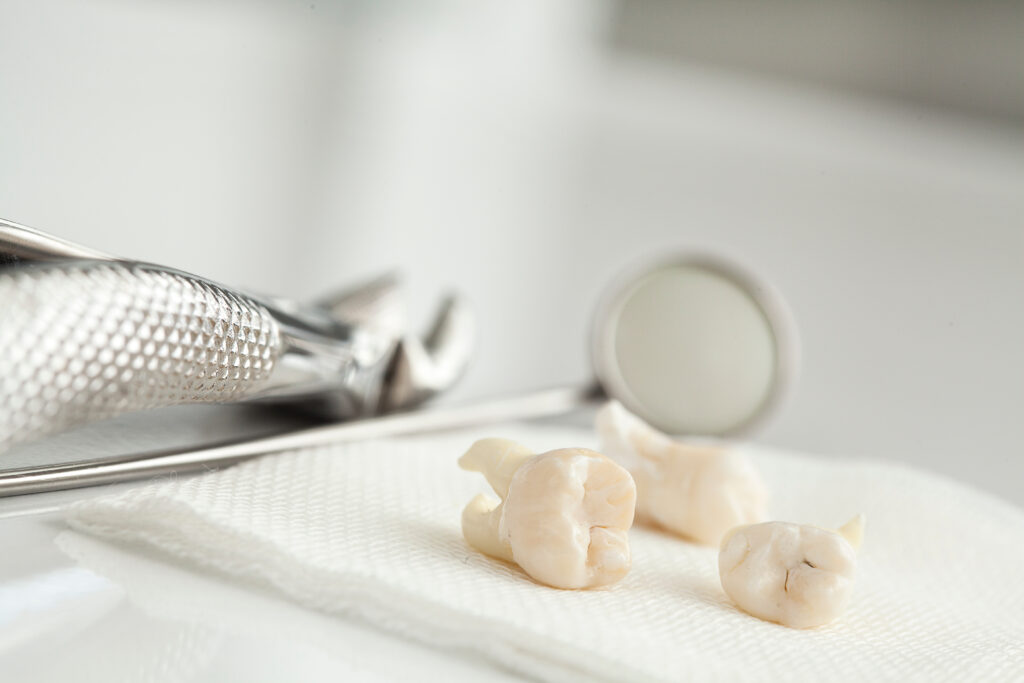Tooth Extraction 101: Everything You Need to Know

At Great Lakes Dentures and Implants, we believe natural teeth are meant to last for a lifetime. We offer comprehensive smile solutions to repair and restore damaged teeth, and we only recommend tooth extraction when absolutely necessary. With our gentle approach, modern anesthetics, and cutting-edge techniques, you can count on us for care that exceeds your expectations.
Why Would You Need to Have a Tooth Extracted?
Dr. McGuire may recommend having a tooth extracted for the following reasons:
Severe Tooth Damage: Deep decay or trauma can sometimes cause extensive damage that cannot be repaired even with root canal therapy. Extracting the affected tooth may be our only option to safeguard the remaining teeth and prevent serious health complications.
Periodontal Disease: If not treated, periodontal disease, also known as gum disease, can progress and destroy the bone and tissues supporting the teeth. That can lead to loose teeth, which may need to be extracted to prevent complications.
Orthodontic Treatment: We sometimes need to remove one or more teeth as a part of an orthodontic treatment plan. We do that to create space for the remaining teeth to shift into alignment, delivering a straight smile.
Impacted Teeth: Impacted teeth are trapped in the jaw, as is often the case with wisdom teeth. That can lead to complications, including pain, infection, and tooth decay. Extracting impacted wisdom teeth is one of the most common oral surgeries performed.
What Happens During the Tooth Extraction Procedure?
Before having one or more teeth extracted, Dr. McGuire will administer local anesthesia to numb the area for your comfort. If you are anxious about the procedure, please let us know. Dr. McGuire can help by offering nitrous oxide or oral sedation to create a calm and relaxed state during treatment.
There are two types of tooth extractions: simple and surgical. You will need a simple extraction if the affected tooth is visible and easy to access. A surgical extraction, on the other hand, is required to remove an impacted, weak, or broken tooth or one with long, curved roots. Most patients report little to no discomfort during or after the procedure.
Depending on the extracted tooth’s location, Dr. McGuire may recommend a dental implant, bridge, or partial denture. Otherwise, the neighboring teeth may shift or drift toward the gap, which may cause crooked teeth and problems with the bite. The imbalance left by a missing tooth can also increase your risk of uneven tooth wear, periodontal disease, and TMJ discomfort.
Promoting Healing After Tooth Extraction
Make sure to follow the care instructions we provide and take the prescribed pain medication if needed. It’s important to avoid drinking from a straw, spitting, or smoking for at least 24 hours. Otherwise, you risk dislodging the blood clot forming in the extracted tooth’s socket, which may lead to a painful condition known as dry socket.
If you have any concerns in the days following your tooth extraction procedure, make sure to contact our office for guidance.
Dental Extractions Near Me in Plainwell, MI
At Great Lakes Dentures and Implants, we understand that the thought of having a tooth extracted may leave you feeling anxious. Dr. McGuire and his team are committed to ensuring your time with us is as comfortable as possible. Patients in Plainwell and the surrounding communities have come to expect the highest level of care and expertise with a compassionate touch. We invite you to call us at 269-888-6686 to schedule your appointment or request one online today!
